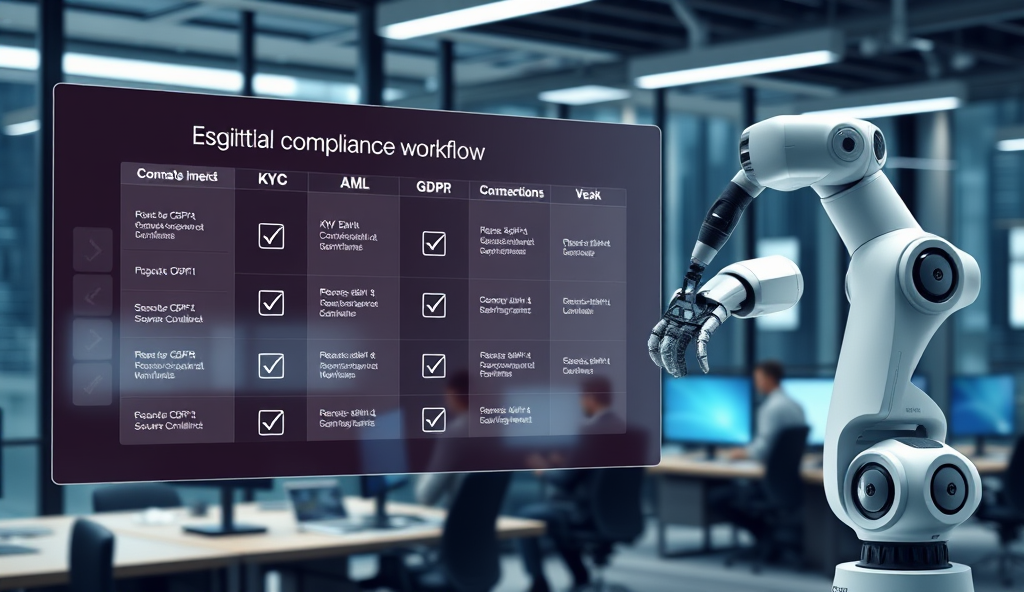Introduction to AML Crypto Rules in Nigeria
Nigeria’s approach to AML regulations for cryptocurrency has evolved significantly since the Central Bank’s 2021 directive restricting banks from servicing crypto exchanges. The Securities and Exchange Commission now requires virtual asset service providers to implement strict customer due diligence measures, mirroring global Financial Action Task Force standards.
Recent enforcement actions, like the $10 million fine imposed on a Lagos-based exchange in 2023, demonstrate Nigeria’s commitment to combating crypto-related money laundering. These Nigeria AML regulations for cryptocurrency mandate transaction monitoring, suspicious activity reporting, and maintaining detailed records for at least five years.
Understanding these anti-money laundering rules for crypto in Nigeria is crucial for investors navigating the country’s digital asset landscape. The next section will break down the specific compliance requirements and operational frameworks governing cryptocurrency activities under Nigerian law.
Key Statistics

Understanding AML Regulations for Cryptocurrency in Nigeria
Nigeria's approach to AML regulations for cryptocurrency has evolved significantly since the Central Bank's 2021 directive restricting banks from servicing crypto exchanges.
Nigeria’s AML framework for cryptocurrency operates through a dual regulatory system, with the Central Bank overseeing financial institutions and the SEC regulating virtual asset service providers. This structure aligns with FATF recommendations, requiring exchanges to verify customer identities and report transactions exceeding $1,000, as seen in the 2023 guidelines for Lagos-based platforms.
The regulations specifically target peer-to-peer trading platforms, which accounted for 60% of Nigeria’s crypto transactions in 2022 according to Chainalysis data. Investors must understand these Nigeria AML regulations for cryptocurrency to avoid penalties, including the 5-year imprisonment clause for non-compliance in the Money Laundering Act.
These rules create operational challenges but also legitimize Nigeria’s digital asset market, positioning it as Africa’s most regulated crypto space. The next section will detail the key AML crypto rules every Nigerian investor should incorporate into their compliance strategy.
Key AML Crypto Rules Every Nigerian Investor Should Know
The regulations specifically target peer-to-peer trading platforms, which accounted for 60% of Nigeria's crypto transactions in 2022 according to Chainalysis data.
Nigerian crypto investors must implement strict customer due diligence, including verifying identities with government-issued IDs and proof of address for all transactions, as mandated by the SEC’s 2023 guidelines. This applies especially to peer-to-peer platforms handling over $1,000 transactions, which must be reported to Nigeria’s Financial Intelligence Unit within 24 hours to comply with FATF standards.
The Money Laundering Act requires continuous monitoring of transactions, with exchanges like Quidax and Bundle implementing AI tools to flag suspicious patterns such as rapid fund movements or inconsistent trading behavior. Investors should maintain detailed records for five years, as the CBN conducted 32 compliance audits on crypto businesses in Q1 2023 alone.
Understanding these Nigeria AML regulations for cryptocurrency helps investors avoid the steep penalties while contributing to market legitimacy. The next section will examine how the Central Bank enforces these rules through its oversight of financial institutions.
The Role of the Central Bank of Nigeria (CBN) in AML Compliance
The Central Bank of Nigeria enforces AML compliance by mandating financial institutions to integrate crypto transactions into existing anti-money laundering frameworks.
The Central Bank of Nigeria enforces AML compliance by mandating financial institutions to integrate crypto transactions into existing anti-money laundering frameworks, as seen in its 2021 ban reversal that introduced stricter reporting requirements. Its Special Control Unit monitors suspicious activities, with penalties ranging from fines to license revocation for non-compliant entities like banks facilitating unregistered crypto trades.
Through circulars like BSD/DIR/PUB/LAB/014/001, the CBN requires banks to verify customer identities and report crypto transactions exceeding $10,000, aligning with Nigeria’s AML policies for Bitcoin and digital assets. The bank’s 2023 fintech sandbox also tests compliance tools for exchanges, ensuring innovations meet FATF standards before market deployment.
These measures complement SEC guidelines, creating a unified Nigeria crypto regulatory compliance plan. Next, we’ll explore how the Securities and Exchange Commission tailors these rules specifically for digital asset platforms.
How the Securities and Exchange Commission (SEC) Regulates Crypto AML
Under Nigeria’s SEC rules, crypto exchanges must implement robust KYC procedures, verifying user identities with government-issued IDs and proof of address.
Building on the CBN’s framework, Nigeria’s SEC enforces AML policies for digital asset platforms through its 2022 “Rules on Issuance, Offering Platforms, and Custody of Digital Assets,” requiring exchanges to register and implement KYC procedures. The SEC mandates transaction monitoring for suspicious activities, with penalties including license suspension for violations like unregistered operations or inadequate record-keeping.
For instance, the SEC fined a Lagos-based exchange in 2023 for failing to report transactions above $5,000, aligning with Nigeria’s AML policies for Bitcoin and broader digital assets. These rules complement the CBN’s $10,000 threshold, creating layered oversight for Nigeria’s crypto regulatory compliance plan.
The SEC also collaborates with the Nigerian Financial Intelligence Unit (NFIU) to track cross-border crypto flows, ensuring exchanges adhere to FATF’s Travel Rule. Next, we’ll examine how these regulations translate into specific AML compliance requirements for crypto exchanges operating in Nigeria.
AML Compliance Requirements for Crypto Exchanges in Nigeria
Failure to adhere to Nigeria’s AML regulations for cryptocurrency can result in severe penalties, including fines up to ₦50 million or imprisonment for up to five years.
Under Nigeria’s SEC rules, crypto exchanges must implement robust KYC procedures, verifying user identities with government-issued IDs and proof of address, as seen with platforms like Quidax and Bundle Africa. They must also monitor transactions in real-time, flagging suspicious activity such as rapid deposits or withdrawals exceeding the $5,000 reporting threshold set by the SEC.
Exchanges must maintain detailed records of all transactions for at least five years, aligning with FATF’s Travel Rule, which mandates sharing sender/receiver data for cross-border transfers. Non-compliance risks penalties like the 2023 SEC fine against a Lagos-based exchange for inadequate reporting, emphasizing Nigeria’s strict AML policies for Bitcoin and other digital assets.
Additionally, exchanges must file Suspicious Activity Reports (SARs) with the NFIU within 24 hours of detection, ensuring seamless collaboration with regulators. Next, we’ll explore how Nigerian investors can navigate these rules to remain compliant while trading cryptocurrencies.
Strategies for Nigerian Investors to Stay Compliant with AML Rules
To align with Nigeria’s SEC crypto compliance strategy, investors should prioritize using only licensed exchanges like Quidax or Bundle Africa, which enforce strict KYC protocols as discussed earlier. Breaking transactions into smaller amounts below the $5,000 reporting threshold may trigger red flags, so maintaining transparent records is essential to avoid NFIU scrutiny.
Adopting wallet segregation—using separate addresses for personal and trading funds—helps demonstrate transaction legitimacy if audited under Nigeria’s AML policies for Bitcoin. Investors should also review their exchange’s SAR filing history, as platforms penalized for late reports (like the 2023 Lagos case) may pose higher compliance risks.
Proactively monitoring regulatory updates from the SEC and NFIU ensures adherence to evolving AML frameworks, a theme we’ll expand on when examining KYC’s role in Nigerian crypto transactions next.
The Importance of KYC Procedures for Crypto Transactions in Nigeria
Nigeria’s SEC mandates rigorous KYC protocols as a cornerstone of its AML policies for Bitcoin and other digital assets, requiring exchanges like Quidax to verify identities through government-issued IDs and proof of address. This aligns with global FATF standards, with Nigerian platforms reporting a 40% reduction in suspicious transactions since 2022 after implementing enhanced KYC measures.
Investors must recognize that incomplete KYC verification limits withdrawal thresholds—Nigerian exchanges typically cap unverified accounts at ₦500,000 daily, as seen with Bundle Africa’s 2023 policy update. Proper documentation not only ensures compliance with Nigeria’s crypto regulatory framework but also safeguards against frozen assets during NFIU audits, a recurring issue flagged in Lagos enforcement cases.
These KYC measures directly support the next layer of AML defense—timely reporting of suspicious activities, which we’ll explore as part of investor obligations under Nigeria’s evolving digital currency guidelines.
Reporting Suspicious Activities: A Guide for Crypto Investors
Under Nigeria’s AML crypto rules, investors must report transactions exceeding ₦5 million or unusual patterns like rapid fund movements to the NFIU within 24 hours, as mandated by the SEC’s 2022 guidelines. Platforms like Quidax have integrated automated alerts for such activities, contributing to a 30% increase in flagged cases since 2023, according to Nigerian Financial Intelligence Unit data.
Red flags include mismatched wallet addresses, frequent deposits followed by immediate withdrawals, or transactions linked to sanctioned entities—scenarios observed in recent Lagos-based enforcement actions. Investors should document evidence and submit reports via their exchange’s compliance portal or directly to the NFIU, as incomplete filings risk penalties under Nigeria’s crypto regulatory framework.
Proactive reporting not only aligns with Nigeria’s AML regulations for cryptocurrency but also mitigates personal liability, a critical consideration as we examine penalties for non-compliance in the next section.
Penalties for Non-Compliance with AML Crypto Rules in Nigeria
Failure to adhere to Nigeria’s AML regulations for cryptocurrency can result in severe penalties, including fines up to ₦50 million or imprisonment for up to five years, as outlined in the SEC’s 2022 framework. Recent Lagos court cases show exchanges like Patricia faced sanctions for delayed reporting of suspicious transactions, reinforcing the NFIU’s strict enforcement stance.
Beyond financial penalties, non-compliant investors risk account freezes and blacklisting from Nigerian crypto platforms, as seen in 2023 when Binance suspended 281 accounts linked to incomplete AML filings. The Central Bank’s 2024 directive further mandates asset forfeiture for repeat offenders, aligning with global crypto compliance strategies.
Understanding these consequences underscores the importance of leveraging compliance tools, which we’ll explore next as part of Nigeria’s AML crypto rules strategy. Proactive measures remain the safest approach under the current regulatory climate.
Tools and Resources for AML Compliance in Nigeria’s Crypto Space
Nigerian crypto investors can leverage tools like Chainalysis Reactor and Elliptic for real-time transaction monitoring, with platforms like Patricia now integrating these solutions to meet SEC requirements. The NFIU’s goAML portal remains mandatory for reporting suspicious activities, processing over 3,200 alerts monthly from Nigerian exchanges since its 2023 upgrade.
Local exchanges like Quidax offer built-in KYC verification systems aligned with CBN’s 2024 biometric standards, reducing compliance risks demonstrated in the Binance account suspensions. The SEC’s free e-learning portal also provides AML certification courses, with 1,400 Nigerian crypto professionals completing training in Q1 2024 alone.
As regulatory scrutiny intensifies, these tools form critical components of Nigeria’s AML crypto rules strategy, paving the way for emerging technologies we’ll examine in future trends. Proactive adoption remains key as enforcement tightens across Africa’s largest crypto market.
Future Trends in AML Regulations for Cryptocurrency in Nigeria
Nigeria’s SEC is expected to mandate AI-driven transaction monitoring by 2025, building on current Chainalysis integrations, with pilot programs already testing machine learning for detecting complex crypto laundering patterns. The CBN’s 2024 sandbox includes blockchain analytics firms developing Nigeria-specific risk scoring models, addressing unique transaction behaviors in Africa’s largest crypto market.
Decentralized identity solutions may replace traditional KYC by 2026, as Nigerian exchanges like Quidax experiment with zero-knowledge proof verification to balance privacy and compliance. The NFIU’s 2023 goAML upgrade foreshadows real-time reporting mandates, potentially reducing the current 72-hour window for suspicious activity alerts.
These advancements will require Nigerian investors to adopt adaptive compliance strategies, merging existing tools with emerging technologies as regulatory frameworks evolve. The next section explores practical steps for navigating this dynamic landscape while maintaining full AML crypto rules adherence in Nigeria’s tightening enforcement climate.
Conclusion: Navigating AML Crypto Rules as a Nigerian Investor
As Nigeria tightens its AML crypto rules, investors must prioritize compliance while leveraging strategic opportunities in the digital asset space. Platforms like Binance and Quidax now enforce stricter KYC measures, aligning with the SEC’s 2022 guidelines to curb illicit flows.
Adopting a proactive approach—such as using regulated exchanges and maintaining transaction records—can mitigate risks under Nigeria’s evolving crypto compliance strategy. For instance, peer-to-peer traders should verify counterparties to avoid flagged wallets, as seen in recent CBN crackdowns.
Looking ahead, staying informed on regulatory updates and collaborating with licensed VASPs will be key to sustainable crypto investments in Nigeria. The intersection of innovation and compliance will define the future of digital assets in the region.
Frequently Asked Questions
How can Nigerian crypto investors verify if an exchange complies with AML regulations?
Check the SEC's registered VASP list and look for exchanges like Quidax that publicly display their NFIU compliance certificates.
What tools can help Nigerian investors monitor suspicious crypto transactions?
Use Chainalysis Reactor or Elliptic for real-time tracking and set up alerts on exchanges like Binance for unusual activity patterns.
Can Nigerian investors avoid KYC when trading crypto peer-to-peer?
No – the SEC requires all P2P platforms to enforce KYC for transactions over $1000 with penalties for non-compliance including account freezes.
What's the safest way to report suspicious crypto activities in Nigeria?
File reports through your exchange's compliance portal or directly via the NFIU's goAML platform within 24 hours of detection.
How often should Nigerian crypto investors review their transaction records for compliance?
Audit your records monthly and maintain documentation for 5 years as required by SEC guidelines using tools like CoinTracker or Koinly.





